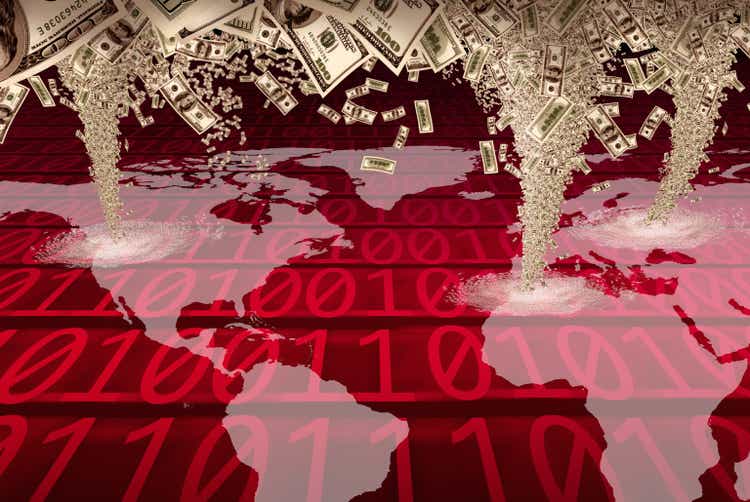imagedepotpro/iStock via Getty Images
In late 2008, at the start of the Great Economic Recession, Queen Elizabeth famously berated the economics profession for not having warned her of a major world economic and financial market crisis. Next year, should the world succumb to another economic and financial market crisis, the economics profession will again come in for severe criticism for having been as complacent about the world economic outlook as they are today. But unlike in 2008, when serious economic weaknesses were largely confined to the US housing and credit markets, today, every major part of the world economy is seemingly prone to a serious economic crisis.
The European economy is perhaps the most immediate cause for concern. Europe facing an energy crisis on the scale of that experienced in the 1970s as Vladimir Putin shuts off Russian natural gas exports to Europe. Not only that, Italy is again beset by deep economic and political difficulties that could trigger another round of the European sovereign debt crisis. It hardly helps matters that in the forthcoming Italian parliamentary elections, a populist anti-European party could form the next government.
According to the International Monetary Fund, if Putin does carry out his threat to keep Europe shut off from Russian gas exports, the German economy could be more than 4 percent weaker than it would otherwise have been. That would come on top of the expected damage to its economy from a once-in-a-century drought, multi-decade-high inflation, and an abrupt slowing in the Chinese economy.
Meanwhile, were we to get another round of the European sovereign debt crisis, it would be more serious than the 2010 Greek sovereign debt crisis, which shook world financial markets. After all, it would now be centered on Italy, which has an economy some 10 times the size of that of Greece.
If Europe has its economic problems, China seems to be in the midst of a perfect economic storm. This has to be of serious concern considering that China has the world’s second-largest economy and until recently was the world’s main engine of economic growth and the largest consumer of internationally traded commodities.
As underlined by the debt default of Evergrande (OTCPK:EGRNF) and some 20 other Chinese property developers, it seems that China’s property and credit market bubble is now finally bursting. This in itself is troubling since the Chinese property sector accounts for some 30 percent of the Chinese economy and housing constitutes some 70 percent of Chinese household wealth.
Compounding China’s economic woes is President Xi’s zero-tolerance COVID policy that has involved locking down major Chinese cities like Shanghai and Beijing. It also hardly helps that China is now too experiencing a major economic drought, President Xi continues to wage an economic war with China’s large tech companies, and relations with the United States over Taiwan are at a low point.
Little wonder then that, in the second quarter, the Chinese economy grew by a mere 0.4 percent from a year ago – well short of the government’s 5.5 percent growth target.
As if Europe and China’s economic woes were not sufficient reason for concern, the World Bank keeps reminding us that we could be on the cusp of another emerging market debt crisis. The bank’s warning rings all too true at a time when higher US interest rates are sucking capital out of the emerging market economies at an accelerating rate and when a Chinese economic slowdown is causing international commodity prices to slump.
All of these world economic problems have to raise serious questions about the wisdom of the Federal Reserve’s current policy of raising interest rates and withdrawing market liquidity at a pace seldom experienced before.
By causing the dollar to soar, higher US interest rates are compounding the rest of the world’s inflation problem. That leaves the rest of the world with little option but to slam on the monetary policy brakes at a time of economic weakness. By incentivizing capital repatriation, higher US interest rates are heightening the chances of another emerging market debt crisis. Meanwhile, by not rolling over its maturing bond holdings, the Fed is now withdrawing market liquidity at a pace of $95 billion a month, further compounding the difficulties already being experienced in the world’s equity and credit markets.
If there is one thing that we should have learnt from the 2008-2009 Great Economic Recession, it is that a US economic crisis can have major spillover effects to the rest of the world economy. This should be making the Federal Reserve more mindful of the serious woes now besetting the rest of the world economy. In the same way that our economic troubles in 2008 triggered a world economic recession, so too could today’s economic troubles as the rest of the world negatively impact our economy and our financial markets.
Editor’s Note: The summary bullets for this article were chosen by Seeking Alpha editors.


Be the first to comment